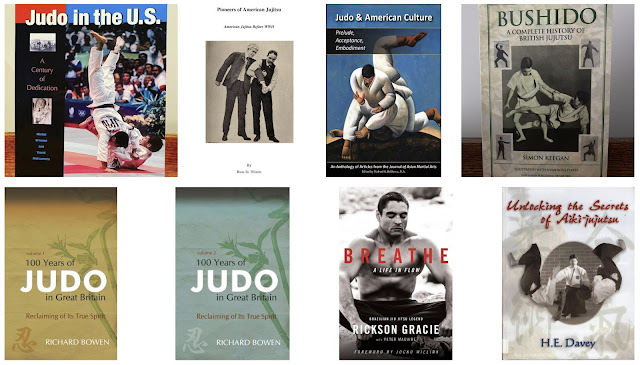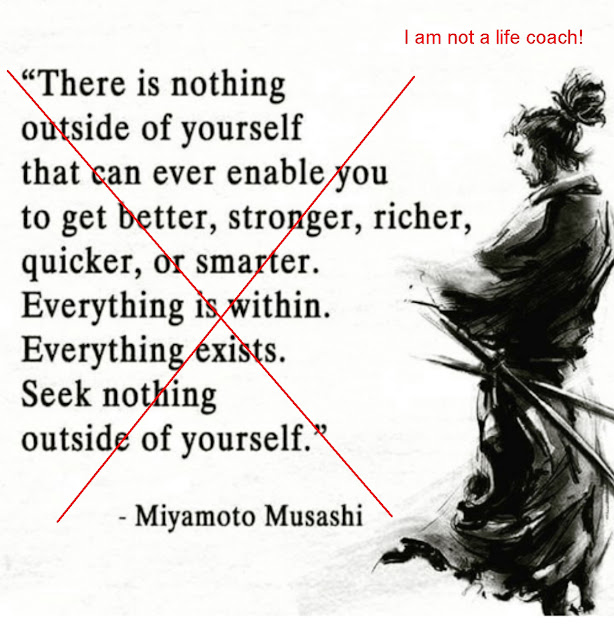August 2021 Book Survey: Judo and Associated Topics
My (Richard's) reading theme for August 2021 was books on judo and associated topics. This was my last set of books from my old reading plan. I'll talk about my new plan at the end of the post.
Introduction
I started August 2021 with a plan to read books on judo history. I made progress with a list I had made, then decided to take a detour when I saw the release of Rickson Gracie's biography, Breathe: A Life in Flow. I also managed to borrow a copy of Unlocking the Secrets of Aiki-Jujutsu via inter-library loan. Soon the month had ended, and I still needed to write this post. I thought it best to post the notes I had and press on with my new plan.
Judo in the U.S.: A Century of Dedication, Michel Brousse and David Matsumoto, 2005
 |
Judo in the U.S.: A Century of Dedication, Michel Brousse and David Matsumoto, 2005 |
Pioneers of American Jujitsu, Russ St. Hillaire, 2004
 |
Pioneers of American Jujitsu, Russ St. Hillaire, 2004 |
I purchased this book in PDF format directly from the author almost exactly one year ago. I did not read it until last month. In March 2021, however, the author released a version via Kindle. I likely need to take a look at that new version before making any real assessment.
Based on my impressions of the 2004 edition, I believe that readers are likely to use this title as a launching point for more detailed research in other sources. However, I'd like to highlight the author's contacts with the O'Brien family. This sort of original research is valuable to the history community.
Judo & American Culture, Michael DeMarco, 2015
 |
Judo & American Culture, Michael DeMarco, 2015 |
Judo & American Culture is a collection of essays edited by Michael DeMarco. The originals ran in his Journal of Asian Martial Arts from 1998 to 2009. There are six articles addressing topics from the mid-19th century through the mid-20th century, not the mid-18th through the mid-20th, as mentioned in the introduction. The first, "Building Men on the Mat" by Geoffrey Wingard, from 2009, is excellent. The second by Matt Hlinak is also solid, although professor Kano was not enthusiastic about judo as a sport. Joseph Svinth's two articles about judo in the Pacific northwest are also worth reading.
Bushido: The Complete History of British Jujutsu, Simon Keegan, 2019
 |
Bushido: The Complete History of British Jujutsu, Simon Keegan, 2019 |
Bushido: The Complete History of British Jujutsu, by Simon Keegan is a tale of two parts. The first, where the author relies on other sources, is generally weak and unhelpful. The second part, where the author does his own research, makes more of a contribution to history. Therefore, you're likely to enjoy this book if you skip the first half and concentrate on the second.
Some of the problems with the first half include the following. First, martial arts in Japan were not "monopolized by professional warriors" prior to 1860 in Japan (p 9). Reading plenty of other sources, mentioned in this blog, will dispel that myth.
Second, the author quotes people like Takeda Tokimune on p 12 but gives no sources at all. It's likely he's relying on Stanley Pranin, but gives no credit.
Third, Mr. Keegan begins his book by complaining about people not using "jujutsu" (as it appears in his title), but he then on p 32 misquotes professor Kano's famous paper to make it appear that Kano wrote "jujutsu" and not "jiujitsu." (See my post Beware Your Sources: A Brief Look at Kano Jigoro's Paper on Jiujutsu and Jiudo-Judo for details.)
Fourth, on p 34 Mr. Keegan says Mataemon Tanabe (1869-1942) beat "Takisaburo Tobari from the Kodokan" in 1881. However, professor Kano founded the Kodokan in 1882.
Fifth, on p 41 Mr. Keegan repeats the myth that catch wrestling arose to settle disputes among coal miners, repeating what he heard from "a coach in Wigan."
Basically, when a book has so many problems and virtually no sources, readers become tired and don't want to keep reading, even when the second half is better.
100 Years of Judo in Great Britain: Volumes 1 and 2, Richard Bowen, 2011
 |
100 Years of Judo in Great Britain: Volumes 1 and 2, Richard Bowen, 2011 |
100 Years of Judo in Great Britain: Volumes 1 and 2, is a curious pair of books, published six years after Mr. Bowen (1926-2005) passed away. The two books reminded my of the Choque and Craze volumes by Roberto Pedreira. Like Pedreira's books, Mr. Bowen's volumes are packed with details on many key people from the history of judo in not only the UK but many other locations. They are a gold mine for historians looking for tidbits of information not easily found elsewhere. In this sense they are a telescope peering into the Richard Bowen (Judo) Collection at the University of Bath.
I'll admit that initially I had a hard time with the text, however. The early writing is rough, with lots of misplaced commas and semicolons. Mr. Bowen's notes on Miyamoto Musashi are shaky, as when he says Musashi "kill[ed] a further sixty or so" people. That is not true; not all his duels were to the death.
Personally I liked the material on BJJ pioneer Mitsuyo Maeda, but did not care for the endless coverage of the Budokwai's finances. It was sad to read excerpts from Koizumi Genji sensei's journal, but it would have made a better appendix to volume 2. I also enjoyed reading how early German judokas based their "judo" on the 1905 book The Complete Kano Jiu-Jitsu (Judo) by H. Irving Hancock and Katsukuma Higashi, which I reported earlier just was not judo.
I recommend adding these volumes to your library as a research resource, but not necessarily trying to read them straight through (as I did).
Breathe: A Life in Flow by Rickson Gracie and Peter Maguire, 2021
 |
| Breathe: A Life in Flow, Rickson Gracie and Peter Maguire, 2021 |
When I heard that Breathe: A Life in Flow was due to arrive in 2021, I was excited to read it. I'll admit to being a Rickson Gracie fan, as I practiced BJJ (pre-Covid) and would like to return (post-Covid). My former head instructor, Pedro Sauer, is a childhood friend of Rickson. I also attended a Rickson seminar in 2017 and managed to snag his autograph in my Gracie Master Text.
 |
| The author as a mighty white belt, with professor Rickson and friends from One Spirit Martial Arts, 2017 |
In brief, Breathe is a great read. Rickson is the story teller or narrator, but Peter Maguire is the author. He tells Rickson's story in a direct and powerful manner, and there's a lot to it. He doesn't pull any punches, and the reader gets a look into the darker aspects of Rickson's life. I highly recommend reading this autobiography. In case anyone is wondering how Rickson approaches the Gracie mythology, there's not that much on the early days of Helio and Carlos -- so much for the better.
Unlocking the Secrets of Aiki-jujutsu, H. E. Davey, 1997
 |
Unlocking the Secrets of Aiki-jujutsu, H. E. Davey, 1997 |
I do not practice Daito-ryu aiki-jujutsu, but I am curious about the art given its relationship with aikido. (I don't practice aikido either, but it is fairly popular with the sort of academic crowd that likely reads posts like this.) I read Unlocking the Secrets of Aiki-jujutsu after managing to borrow a copy via inter-library loan. The book has some odd takes on history, such as "Contrary to popular opinion, however, the samurai as a group never rules Japan during its era of martial government..." Rather, "classical bushi ruled Japan," and "samurai actually refers to a kind of rank, or social status, among bushi, and it was a relatively low one at that" (p 22). This is sort of true, but you're unlikely to find any real historian who says samurai did not rule Japan for centuries.
Mr. Davey is apparently a fan of the late Donn Draeger and his myths as well, writing that bujutsu was "not now, nor have they ever been, methods of self-defense," because they are for -- you guessed it -- "battlefield conditions." Also, "most authorities in Japan have always distinguished budo from bujutsu" (pp 22, 26).
Still, Mr. Davey is remarkable sanguine at other times. For example, he favorably quotes Wayne Muromoto's critique of so-called "Koryu tough guys" (p 27). On p 33 he writes "no bona fide densho that can trace the lineage of Daito Ryu to a point before the time of Saigo Tanomo (1830-1903) and Takeda Sokaku (1859-1943) has been made available to independent researchers."
In general, this book is well-written and nicely produced, offering history, interpretation, and technique. Unfortunately, it is out of print.
Conclusion
If I had to recommend one book from this list, it would be Breathe by Rickson Gracie.
Regarding my reading plan, I have now restructured it. It lasts until the fall of 2025. My focus for the next few months will be on print books that I have not surveyed, regardless of topic, followed by Kindle titles that I have not surveyed, again more or less regardless of topic. Once I have covered those books, I will begin surveys grouped by theme, although using big "buckets" -- history, biography, and the like.
My purpose for these surveys is to record my impressions of these books. This helps identify worthwhile sources for future research, and also hopefully guides readers away from problematic texts and towards more reliable volumes.
If you like this article, check out our Facebook page, Instagram account, Twitter feed, and Amazon Wish List. Be devoted!




Comments
Post a Comment